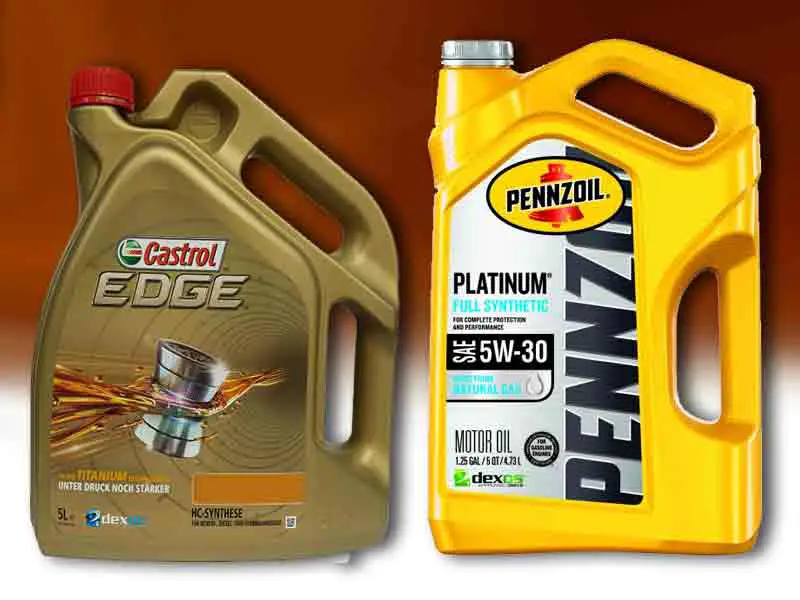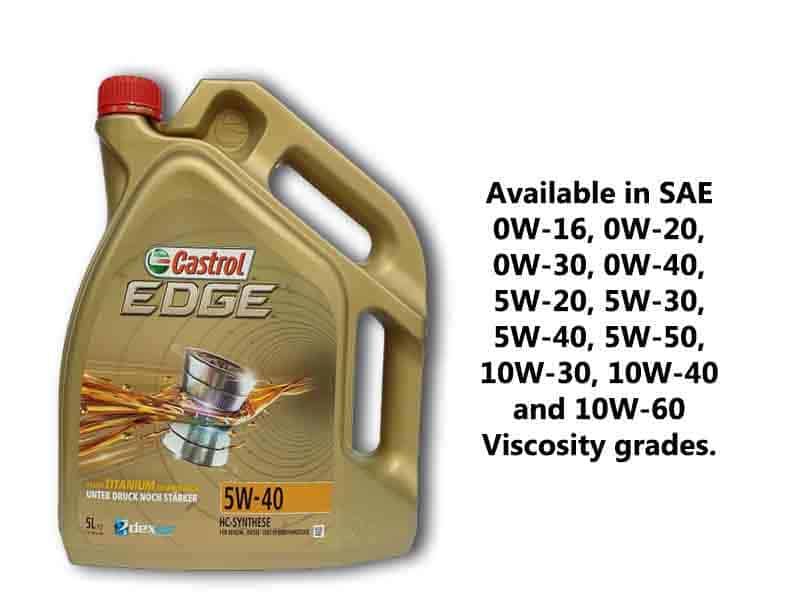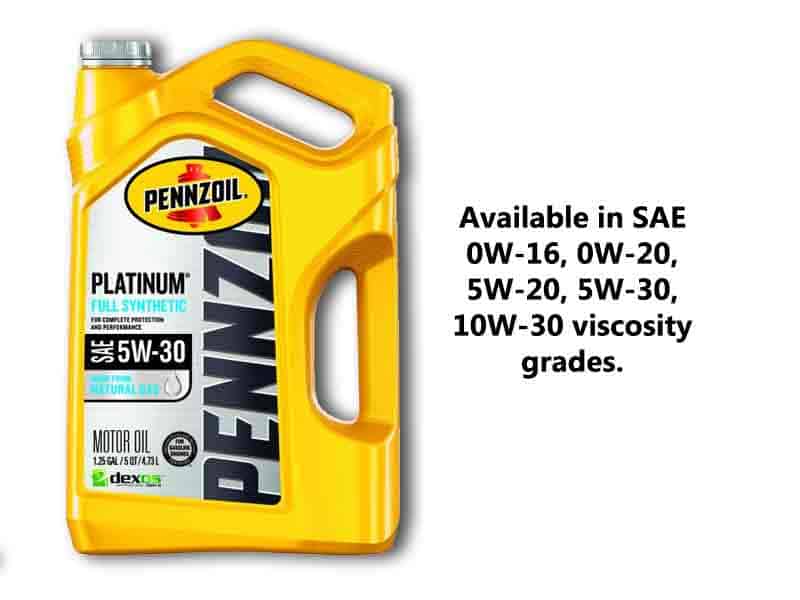Motor oil is the life fluid of your engine and both Castrol Edge Titanium and Pennzoil Platinum are excellent options for a clean and more efficient engine. Both oils are completely synthetic, are available in a wide variety of viscosity ranges, and are designed to protect your engine from wear and tear, with minimal adverse emissions.
It doesn’t matter whether you have a gasoline or diesel fueled car, these oils work with both, Castrol Edge is ideal for your everyday driver, like a Toyota Camry, Ford Explorer, or Chevy Impala, whereas the Pennzoil Platinum is also great for turbocharged cars, like the new 10th gen Honda Civic, Ford Mustangs, and large turbocharged SUVs like the 2022 Land cruiser.

Though both motor oils are widely recognized and trusted in the market, they have certain dissimilarities that could make them a more viable option for any buyer.
| Specifications | Castrol Edge Titanium | Pennzoil Platinum |
| Oil type | Fully Synthetic | Fully Synthetic |
| Engine Type | Both Gasoline and Diesel | Both Gasoline and Diesel |
| Available Viscosity Grades | SAE 0W-16, 0W-20, 0W-30, 0W-40, 5W-20, 5W-30, 5W-40, 5W-50, 10W-30, 10W-40 and 10W-60 | 0W-16 0W-20 5W-20 5W-30 10W-30 |
| ILSAC specification | GF-5 | GF-5 |
| API | SN | SN Plus |
| Cost (per 5 quarts) | $28 | $28 |
| Oil Change frequency | 15000 miles | 15000 miles |
Table of Contents
Looking at their Viscosity:
When it comes to engine oil, Viscosity is one of the most important factors to be considered. It determines how the oil reacts to changes in temperature, speed, and pressure.

If the viscosity is too high it can cause unnecessary wear to your engine, especially in the morning, when you start your car, on the other hand, if it is too low, you have reduced oil pressure and lower power as well.
Temperature is one of the most important factors that affect the viscosity of motor oil, therefore, you need to get an oil with a viscosity variation that is ideal for your environment.
Both Castrol Edge Titanium and Pennzoil Platinum are multigrade viscosity oils. Castrol Edge is available in SAE grades of SAE 0W-16, 0W-20, 0W-30, 0W-40, 5W-20, 5W-30, 5W-40, 5W-50, 10W-30, 10W-40 and 10W-60 which means that they are suitable for almost any kind of environment. Pennzoil Platinum is also available in all the same SAE grade Viscosities.

So, in terms of viscosity, Pennzoil Platinum is the winner, simply because you get more options
Oil Type Comparison:
Different kinds of engine oil have changed significantly over time. Initially, motor oil was made from Crude and had more impurities, however, these days, people are opting for synthetic motor oils.
Both Pennzoil Platinum and Castrol Edge are fully synthetic oils, made completely through chemical engineering. Synthetic oils have a more uniform molecule structure and fewer impurities. Synthetic motor oil doesn’t have to be changed as often, and it doesn’t leave too much residue and sludge in your engine either.
So, both oils have the same type, they are both high-quality synthetic oils
Additives comparison:
Though oils are made synthetically these days, they are still a combination of base oil and additives. However, these days, the base oil makes up 70-90 percent of the motor oil composition, whereas additives make up only 10-30 percent.
The Castrol Edge claims to have Titanium-based additives, primarily Titanium Oxide nanoparticles, which make for a great oil additive, as they bind to the surface of the engine parts and create a wear-resistant surface.
On the other hand, Pennzoil Platinum has a zinc-based additive called Zinc Dialkyl Dithiophosphate, which protects the engine in a similar way as the Titanium additives in the Castrol Edge.
However, studies have shown that Zinc based additives can lead to more harmful emissions, which is why Pennzoil has to use a very low amount to comply with the API (American Petroleum Institute) and has an SN plus rating. Studies have also shown that Titanium Based protective additives are better for the environment, and provide the same level of wear protection as zinc-based additives, if not better in certain circumstances.
Therefore, in this regard, Castrol Edge takes the clear lead, since they use more modern Titanium-based additives.
Engine performance comparison:
Both the oils are designed to work with both diesel and gasoline engines and have protective additives in them as well. However, because of the titanium-based additives, the Castrol Edge may be slightly more favorable.
Though both oils provide excellent engine protection, fuel economy, sludge avoidance, and seal compatibility, one thing that sets them apart is their performance with turbo engines. The Castrol Edge has an API SN rating, which is great across the board, however, Pennzoil Platinum goes a step further, and has an API SN Plus rating, which is a motor oil specifically designed for turbocharged engines.
Pennzoil Platinum oil protects against Low-Speed Pre-Ignition (LSPI), which is a common engine condition known to occur in Turbocharged Gasoline Direct Injection engines.
So, if you have a turbocharged car, Pennzoil Platinum is the better option.
Catalytic Converter performance:
Apart from the engine, another important part of your vehicle that the motor oil affects is the Catalytic Converter. The objective of this device is to convert harmful and poisonous gases from exhaust fumes into less dangerous alternatives.
One of the most poisonous substances that make their way to the catalytic converter is Phosphorus. Though all oils, even synthetic ones do have traces of phosphorus, in some the levels can be higher than others.
Both the oils in comparison are very safe and meet API and ILSAC safety standards, however, Pennzoil does have zinc-based additives, which can produce phosphorus in reaction with other elements in the oil. Studies have shown that modern Titanium-based protective additives are better for the environment, and they will also put less stress on your Catalytic converter.
Therefore, in this comparison, Castrol Edge takes the win.
Fuel Economy Comparison:
The engine oil you use also affects your fuel economy. The main purpose of engine oil is to act as a lubricant, decreasing resistance between the pistons and other moving engine parts, which ultimately increases fuel economy.
There are several factors in oil. The effect is the ability to decrease resistance, however, one of the most important ones is viscosity. Oils with a lower viscosity at operating temperatures are better for fuel economy.
Though both oils are available in the same SAE viscosity ranges, Pennzoil Platinum does also come in 0W-40, which makes it the winner in regards to viscosity.
The second most impactful motor oil-related factor that affects your engine’s fuel economy is sludge. Sludge is the waste material left in the engine after the engine oil is burned. One of the best ways to avoid this is to change the oil regularly, however, Modern synthetic oils have cleaning additives that protect the engine from sludge.
Though the difference might be very small, Castrol Edge does have better engine protection and sludge avoidance additives, contributing to a better fuel economy.
So, since both oils take the lead in one factor, let’s call this comparison a Tie.
Change Intervals comparison:
Another important thing to consider when choosing motor oil for your engine is the frequency at which you will have to change it. Crude-based oils had a very low range and had to be changed frequently, however, for fully synthetic oil, like both in comparison here, the change intervals are quite long across the board.
However, some oils are still better than others. Typically, both these motor oils have a change interval of 15000 miles recommended by the manufacturer, Castrol Edge does go a little high, suggesting that with exclusive use, it can work perfectly for up to 20000 miles.
So, if you want an oil that you have to change less frequently, Castrol Edge is the way to go, which is why it wins the Change interval comparison.
Price Comparison:
All the other factors aside, if you are going to add motor oil to your engine, the cost is also probably a significant factor that will affect your choice. Though both Castrol Edge and Pennzoil Platinum fall in the same price bracket, Pennzoil Platinum is a little cheaper than its competition across the board.
The price for five quarts of Castrol Edge is $28, whereas the cost for the same amount of Pennzoil Platinum is around $23 at Walmart.
So, Pennzoil Platinum is the more affordable option and hence wins the Price Comparison.
Conclusion:
Both oil, the Castrol Edge Titanium and Pennzoil Platinum are best-selling products in the market, and they offer excellent engine protection. However, both have areas where they are better, and some in which they are lacking.
Pennzoil Platinum is available in a larger range of viscosities, whereas Castrol edge has better engine protection capabilities. Both have a similar impact on your fuel economy, however, the Pennzoil Platinum is better for turbocharged cars. Still, when it comes to range and change intervals, Castrol edge is better.
You can say that both the oils are approximately similar in performance, however, Pennzoil Platinum is cheaper. Either way, you won’t regret choosing any one of these oils, and they are great for the protection of your car and your engine.
So, if you were on edge with your decision, we hope this post gives you the required information to get across.